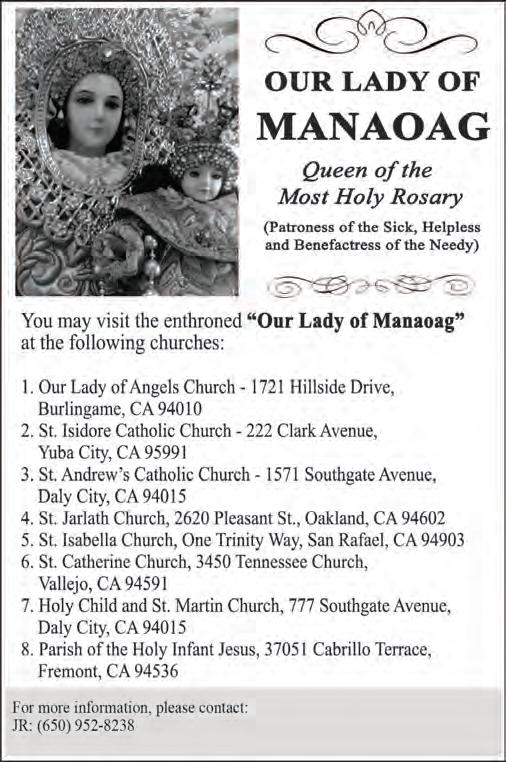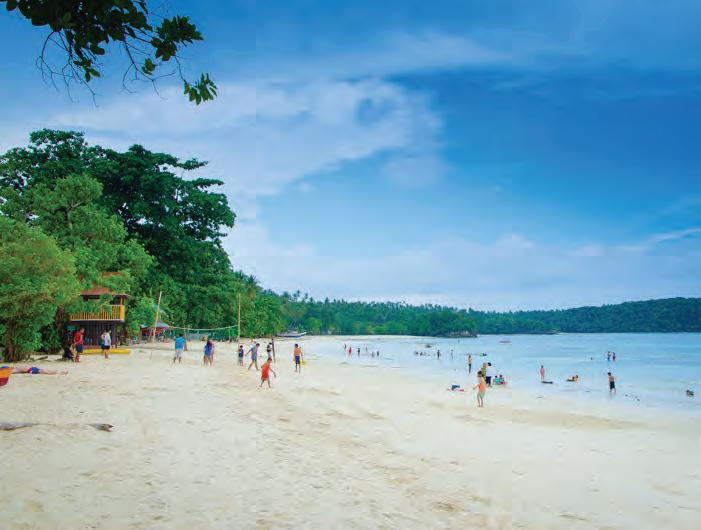
31 minute read
STOP ASIAN HATE. People a� end a rally against racism and violence on Asian Americans in Flushing of New York, the United States on March (Xinhua/Wang Ying)
Offl ine
(From Page 13)
They know that an early exit is a possibility, so they are very likely guaranteeing themselves a neat little fortune stashed away somewhere. The bigger their golden parachute, the better.
I do not know if the Lord will hear my prayers where the evil Duterte regime is concerned. But I will say that He has answered all of my prayers, all in His time.
I do know that He will not answer one prayer, that Duterte fall ill and become permanently disabled soonest, thereby forcing him to surrender the reins of government to the vice president.
Such a prayer is unchristian, I know, but I squeeze it in just the same.
Then again, it is said that the Lord works in mysterious ways. It goes by many guises, but the law of karma, of cause and eff ect, of sowing what one reaps, is universal.
Sooner or later, Duterte will get what he deserves, and it will not be pretty.
To quote Romans 12:19, Do not avenge yourselves, beloved, but have room for God’s wrath. For it is written: “Vengeance is Mine, I will repay, says the Lord.”
Amen to that. Immigrant’s story... (From Page 13)
Aquino and VP Jejomar Binay in 2010.
Then Duterte was elected president in 2016 with Leni Robredo winning as VP. Many hoped that the Duterte presidency would usher a “new political era” in the history of the Philippines but it appears that with just more than a year left in his term, Duterte has failed to make any signifi cant mark as president.
May the new president who will succeed Duterte in 2022 do a better job in leading the Filipino people in reforming the political structure and culture of the Philippines. It is time to have leaders who will genuinely serve the true interest of the nation and its people.
Health & Wealth (From Page 12)
“My faith in the reliability of the Word of God and the actuality of the resurrection of Christ and Truths presented by the Apostle Paul have enhanced and encouraged,” wrote Judy Miller, author of 19 motivational and Christian books, Pasadena, Texas, USA.
“I personally recommend this book to the young people and millennials like me. This is a tremendous guide in the wisdom so needed in youth,” said Brent M. Solis, Evangelist and Minister, DAGUPAN CITY CHURCH OF CHRIST, Dagupan City, Pangasinan, Philippines.
“HISTORICITY OF JESUS is not only a tool for Christian workers in the fi eld, but it can be a helpful teaching tool in our Sunday schools, fellowships, lectureships and other gatherings,” wrote Atty. Junas T. Sagurit, President, Asian Christian University, Bugallon, Pangasinan, Philippines.
“I eagerly recommend this book to all, notably to our Roman Catholic friends, said James Quitoriano, former Roman Catholic, and now Minister, GOLDEN GATE CHURCH OF CHRIST in San Francisco, California, USA.
To get your autographed copies of the two books plus a Bible, just attend the Special Sunday with Edwin Bacani on April 11, 2021.RSVP: (650)438-3531 or (415)584-7095 or email:agmadlaing@hotmail.com *ART GABOT MADLAING is accredited and commissioned Notary Public and licensed Real Estate Broker (DRE #00635976) in California since 1981. He is founder of MOBILE SIGNING SERVICES, FITNESS FOR HUMANITY (aka FITNESS FOR CHRIST) and ACAPINOY. Art is active Evangelist with the GOLDEN GATE CHURCH OF CHRIST in San Francisco, California USA.
PerryScope... (From Page 12)
could aff ect the “peace an stability” in the disputed territory.
The Philippine government then demanded the immediate withdrawal of the Chinese vessels. It noted that the lingering presence was a “blatant infringement of the Philippines’ sovereignty, sovereign rights, and jurisdiction.”
The Philippine military also ordered more navy ships to be deployed to the WPS. This led Philippine Senate President Tito Sotto to say that he is not worried about the presence of the Chinese militia vessels in the WPS because of Manila’s defense treaty with the US, its longtime ally. He said that the 70-year-old Mutual Defense Treaty (MDT) should be invoked if hostilities escalate between the Philippines and China. He said that if China attacks the Philippines’ navy ships it’s a violation of the MDT, which says that if a Philippine government boat or any property is attacked, “the MDT takes eff ect right away.”
The lesson of Mischief Reef
In 1991, the Philippine Senate voted to reject the extension of the American bases agreement. The nationalists in the Senate were convinced then that the Philippines didn’t need the protection of the U.S. against foreign invasion. They asserted that continued presence of American bases was an aff ront to Philippine sovereignty. However, they didn’t demand for the rescission of the MDT, which obligated the U.S. to defend Philippine territory in the event of foreign invasion. It’s like them saying, “We don’t want you around but we expect you to defend us if we are invaded.” Indeed, it’s a love-hate relationship that is nurtured to this day.
The following year, the US bases were closed when the termination took eff ect. Three years later, on February 8, 1995, Filipino fi shermen observed a Chinese fl ag fl ying over the Mischief Reef, which is only 135 miles from Palawan. Eight Chinese ships were also in the area and some were armed. And the Philippine Armed Forces couldn’t do anything to take it back.
As an afterthought to the Senate’s folly of booting out the Americans from Philippine soil, which left the Philippines at the mercy of a foreign country who’d use force to nibble at its territory, the U.S. and the Philippines signed a Visiting Forces Agreement (VFA), which would allow the stationing of American forces on Philippine soil. The Senate ratifi ed it on May 27, 1999, which makes one wonder how the senators -- who voted to remove the U.S. bases in 1991 -- voted for the VFA eight years later? Once again the nationalists went up in arms claiming that the VFA violates the Philippine constitution. But the VFA remained in force simply because the Philippine senators realized that they made a major blunder in terminating the bases agreement.
Makeshift structures
When the Chinese occupied Mischief Reef in February1995, they built makeshift structures on stilts that they used as fi shermen’s shelter. The Philippine government protested the incursion but the Chinese said that they’re using them to shelter all fi shermen at night including Filipinos who might need it. In 1998, the makeshift structures were replaced with permanent buildings. Years later, a military garrison was built and troops were stationed there. Twenty years later, China built an artifi cial island on it and built a huge air and naval base. The Chinese call it their “Pearl Harbor” in the South China Sea. Justice Carpio said that he’s worried that “they will now start claiming, building on Juan Felipe Reef, just like what they did to Mischief Reef in 1995.”
The Chinese occupation of Mischief Reef serves as a lesson to President Duterte. Today, he is faced with a dilemma: What would he do if China refuses to withdraw its 200 vessels from the Julian Felipe Reef and starts building fi shermen’s shelter just like it did 26 years ago on Mischief Reef?
It seems like it’s déjà vu all over again. (PerryDiaz@ gmail.com) Diliman way
(From Page 12)
stitution, execute its laws, do justice to every man and conserve myself to the service of the Nation. So help me God.” The acts of Duterte as President directly contradict this provision of the Constitution. Note the following acts of Duterte and his boys: First, Extra-judicial killings which number in tens of thousands- inspired by President Duterte and executed without limit by his unthinking enforcers, specifi cally, PNP and, to a certain degree, the PDEA – the current versions of the Davao Death Squads. The killings violate the due process and equal protection clause under section 1 and Article III of the Constitution on the Bill of Rights. By this kind of action, other provisions of the Constitution are also violated – section 2 of Article II which provides the duty of government to protect the people; section 5 of the same Article which sanctifi es the protection of life; section 11, also of the same Article under which the “State values the dignity of every human person and guarantees full respect for human rights.”; and section 17 of Article VII where he is mandated to”ensure that the laws be faithfully executed.” Second, The giving away of our valuable resources in our economic zones and territory in the West Philippines Sea to communist China and paying obeisance to his foreign master, Xi Jin Ping. This is in direct violation of our sovereign right as a country. It also violates section 7, Article II of the Constitution which provides that – “The State shall promote an independent foreign policy. In its relation with other states the paramount consideration shall be national sovereignty, territorial integrity, national interest, and the right to self-determination.” Where has this provision gone with the Duterte administration? It has gone to the waste basket of communist China’s Xi Jin Ping? Independent foreign policy as implemented by Duterte is like an action of a beggar in the streets of Metro Manila. Is that independent? National sovereignty has become a joke. Where is territorial integrity? It has become a scandal. Is the interest of Xi Jin Ping’s China our national interest? Where is right to self-determination? Are we on our way to becoming a province of Communist China? We certainly will be – if President Rodrigo Roa Duterte has his way. I’m sure President Duterte has not forgotten he is the Commander-in-Chief of the Armed Forces of the Philippines under section 18 of Article VII of the Constitution. I’m even surer he remembers since he calls the AFP his military. So why did not his military do anything when the Communist Chinese invaded the West Philippine Sea, built islands and installed military installations, including possible nuclear weapons? In obedience to its master, the Armed Forces of the Philippines did nothing. In the inimitable words of the late Mayor Arsenio Lacson – deaf, dumb, mute, napako sa silya, (nailed to the chair) The AFP forgot that under section 3, Article II of the Constitution its duty is well-defi ned – “The Armed Forces of the Philippines is the protector of the people and the State. Its goal is secure the sovereignty of the State and the integrity of the national territory.” Why did it not do anything? Is it due to high salaries its members are now receiving? Is it due to the appointments of colonels and generals to high civilian positions after retirement where they are doing their on the job training (OJT)? Have President Duterte and the members of the AFP organized a mutual admiration club? Are the members of the military more loyal to the President Duterte than to the people and the country? Are their salaries paid by Dutertte? These questions need to be answered because of the total failure of Duterte and his military to follow their duties under the Constitution on the Chinese communist invasion and take over of the West Philippine Sea. Third, Section 27 of Article II of the Constitution provides that – “The State shall maintain honesty and integrity in the public service and take positive and aff ective measures against graft and corruption.” But no such positive and eff ective measures have been taken by the government of President Duterte.
Upside...
(From Page 11)
me, and I work to continue her legacy through my advocacy work with the Filipino Community Center in SF,” said Ramilo. “Our family is so grateful for this recognition of her impact and dedication to all,” Bulos’ only child Elizabeth Ramilo shared her appreciation with Inquirer.net. “She would want us to remember community members and families in need. And to help make positive changes to support issues such as aff ordable housing, veterans’ benefi ts, women’s rights, fi nancial aid because of our pandemic, and aff ordable healthcare for all,” the medical assistant told Inquirer.net. “She encouraged everyone to be involved with a smile and a caring heart.”
Bulos is among three South San Francisco women “trailblazers” to receive permanent offi cial honors from their hometown. Also to honored are pioneer SSF City Council Members Robert Cerri Teglia and Karyl Matsumoto. Mayor Mark Addiego said Magnolia Center will be named after Cerri Teglia, a “South City” native who broke many barriers as the fi rst female member of the City Council and four-time Mayor between 1978-1995. As a passionate advocate for older adults, she led eff orts to plan, fund and build what was earlier known as the Magnolia Senior Center.
Nicolas lauded recently retired Council Member Karyl Matsumoto as the spearhead for the Catrain station in progress that will bear the latter’s name. Having represented South San Francisco on the board of the Transportation Authority and San Mateo County Transit District or SamTrans, Matsumoto “incorporated her vision of a community plaza with art, landscaping, and accessibility features” and “persevered” throughout her City Council tenure from 1997-2020 in ensuring “getting the funding needed to make this project a reality.”
In 2019 South San Francisco took a fi rst step to honor Bulos’ contributions with a campaign to exhibit photographs and documents of her life at the Grand Library of the South San Francisco Public Libraries.
Nicolas and librarian Eva Martinez collaborated on “Filipino American Empowerment: Celebrating the Legacy of Alice Pena Bulos,” drawing residents and friends whose lives Bulos touched. Martinez noted the dearth of representation from the FilAm community and took steps to fi ll the void.- Adapted from original reprinted from Inquirer.net
Global leaders unite in urgent call for international pandemic treaty
GENEVA - The international community should work together “towards a new international treaty for pandemic preparedness and response” to build a more robust global health architecture that will protect future generations, world leaders said in a commentary published in several newspapers around the world.
“There will be other pandemics and other major health emergencies. No single government or multilateral agency can address this threat alone,” the leaders say in their article. “The question is not if, but when. Together, we must be better prepared to predict, prevent, detect, assess and eff ectively respond to pandemics in a highly coordinated fashion. The COVID-19 pandemic has been a stark and painful reminder that nobody is safe until everyone is safe.”
The main goal of a new international treaty for pandemic preparedness and response would be to foster a comprehensive, multi-sectoral approach to strengthen national, regional and global capacities and resilience to future pandemics. This is an opportunity for the world to come together as a global community for peaceful cooperation that extends beyond this crisis.
According to the article, the treaty “would be rooted in the constitution of the World Health Organization, drawing in other relevant organizations key to this endeavour, in support of the principle of health for all. Existing global health instruments, especially the International Health Regulations, would underpin such a treaty, ensuring a fi rm and tested foundation on which we can build and improve.”
The commentary has been signed by J. V. Bainimarama, Prime Minister of Fiji; Prayut Chan-o-cha, Prime Minister of Thailand; António Luís Santos da Costa, Prime Minister of Portugal; Mario Draghi, Prime Minister of Italy; Klaus Iohannis, President of Romania; Boris Johnson, Prime Minister of the United Kingdom; Paul Kagame, President of Rwanda; Uhuru Kenyatta, President of Kenya; Emmanuel Macron, President of France; Angela Merkel, Chancellor of Germany; Charles Michel, President of the European Council; Kyriakos Mitsotakis, Prime Minister of Greece; Moon Jae-in, President of the Republic of Korea; Sebastián Piñera, President of Chile; Carlos Alvarado Quesada, President of Costa Rica; Edi Rama, Prime Minister of Albania; Cyril Ramaphosa, President of South Africa; Keith Rowley, Prime Minister of Trinidad and Tobago; Mark Rutte, Prime Minister of the Netherlands; Kais Saied, President of Tunisia; Macky Sall, President of Senegal; Pedro Sánchez, Prime Minister of Spain; Erna Solberg, Prime Miniser of Norway; Aleksandar Vučić, President of Serbia; Joko Widodo, President of Indonesia; Volodymyr Zelensky, President of Ukraine; Dr Tedros Adhanom Ghebreyesus, DirectorGeneral of the World Health Organization. Meanwhile, the report of the international team on their Wuhan fi eld visit, from 14 January to 10 February, was published as WHO Director-General Dr Tedros Adhanom Ghebreyesus called for further studies.
The report stems from a Member State resolution adopted by consensus at the World Health Assembly in May 2020 and calling on WHO “to identify the zoonotic source of the virus and the route of introduction to the human population, including the possible role of intermediate hosts, including through eff orts such as scientifi c and collaborative fi eld missions.”
In remarks to Member States, Dr Tedros, who received the full report on the weekend, thanked the team for their tireless work. He said it advances our understanding in important ways, while raising questions that will need to be addressed by further studies, as noted in the report.
PHILIP S. CHUA
Heart of Hope
Whenever I hear the notorious excuse or description “Filipino Time,” I feel a grave insult is hurled at my people, even if the generalization is usually uttered by my fellow Filipinos themselves. The defensive rationalization is usually accompanied by a snicker or laughter, a demeanor that trivializes the seriousness of the behavioral impropriety and rudeness. To accept the insinuation that tardiness is a natural birth trait of the Filipino is to malign our people and irresponsibly admit that we are not educated and cultured enough, and that we are socially uncouth, ill-mannered, and uncivilized. This is no laughing matter and I do not fi nd this funny. And I vehemently object to this unfair characterization. I have been in the United States since 1963, and over the past 58 years, I have observed the transformation of “Juan(a) de la Cruz,” albeit sometimes with stubborn reluctance, to an individual more conscious of time, of the value of punctuality, and of the proper respect for other people’s schedule. There is no question that environment plays a fundamental role, second to training at home and in school, in the development of the behavior, trait, character, attitude and thinking of an individual. With this particular “syndrome,” genetics cannot deservedly take the blame. The culpability rests on the “infected ones” and not on the entire Filipino people. While I can sense, and am proud of, the improvement in the matter of punctuality among many of our kababayan abroad and in the Philippines, especially among the younger generation, tardiness and the seeming lack of perception of time among a signifi cant number of us is still rampant and bothersome. And what makes it more tragic is the apparent acceptance by many of our fellow Filipinos that being tardy is “normal, acceptable, excusable, or should be tolerated,” because, after all, “it is the Filipino Time.” This vexing acquiescence is unfair and a disservice to our people and to our nation as a whole. I refuse to surrender, even for a moment, to the notion that we, as a people, are culturally, socially, and ethically inferior to the Americans or to any other civilized peoples of the world. Punctuality is not an exclusive trait of the people of the United States or of the Europeans. While I abhor the lack of punctuality among anyone and admit with embarrassment and dismay that many of us Filipinos (and other nationalities, of course) are guilty of this off ensive bad habit, I still believe that, with proper training and discipline, starting from the nursery school, the Filipinos will be capable of developing the trait of punctuality, and discipline, among others, in them. Especially today, when time is gold. There was an incident in Cebu a few years back when a father accompanied his 5-year-old daughter to a nursery/kindergarten school class (dance) presentation on its foundation day. The “invitation” said 3:30 P.M. When they got to the school, there were only about a dozen other kids waiting, out of the two hundred or so participants expected. The program did not begin at 4:00 or 4:30, not even at 5:30. It started at 6:35, more than three hours late. This delay actually prevented this dad from attending a previous dinner engagement he had at 7:30 that evening. And this made me wonder. How can we teach our children about punctuality, the value of time, and the respect for other people’s schedule, if we, their elders, especially the school administrator and faculty, display before these young impressionistic minds our own careless disregard for promptness and our lack of respect for other people’s commitments? Many of us usually come up with a dozen excuses for our misbehavior or misadventures. For being late for our appointment, meeting or party, we blame the Spaniards, our society as a whole, the alarm clock, the traffi c, the car battery, the babysitter, or even the innocent baby itself. The usual rationale we hear from many is “they won’t start on time anyway; we’ll just waste our time waiting there.” And the vicious cycle goes on. Making excuses or shifting the blame does not accomplish anything and only makes matters worse. Perhaps, its time to look at the mirror to view the real culprit, make the accurate critical diagnosis, and self-prescribe the appropriate treatment --- promptly! Let us set a good example for our children by showing them how we value and manage time, how time lost can never be recovered, and how we respect other people’s agenda. It’s about time we lost this bad reputation. The “Filipino Time” syndrome is a disease only of those inconsiderate selfi sh compatriots of ours who simply don’t give a damn, and not of the entire Filipino people. So, when someone is late for an appointment, I beg you to, please, not to mention the lame excuse “Filipino Time” when I am around, otherwise, I won’t be responsible for my inexplicable but prompt ferocious reaction. *** I often hear the comment that the Filipino people are not disciplined. Against my better judgment, I had refused to believe it…until I experienced it fi rst hand. Several times. And here are a couple of examples during a visit to the Philippines. One time, I took the WG&A Our Lady of Fatima boat to Ozamiz for a business meeting in Oroquieta. Going down the stairs on the return trip to Cebu, I encountered a chaotic mob of “carriers” with pieces of luggage on their shoulders and around their arms and passengers alike inch their way recklessly to make their hurried exit, almost knocking people down the stairs. The jam slowed down the whole process quite a bit. Why we could not have spontaneously organized ourselves, formed a single line, and walked down the stairs in an orderly, more effi cient, comfortable, safer fashion, and faster, is puzzling to me.
Another observation: Unruly drivers who broke traffi c laws every chance and every which way they could, instantly became law-abiding and a model drivers when they entered Clark Field airbase, where strict US-style traffi c rules were enforced with severe penalty. Once they got lout of Clark, they were transformed back to their reckless driving manners. This Jekyll and Hyde behavior is inspired by the lack of discipline, responsibility, and dereliction of duty of law enforcement agencies elsewhere in the country. Fortunately, the young children, the hope of our country, behave in a more civilized manner. When the teacher announces treats for them, these kids form a single line themselves, and take their proper turns in receiving the goodies. No shoving, no pushing, or taking advantage of one another. Each simply waits patiently for his/her turn. Perhaps, we adults should watch more children’s television shows (instead of “F” garbage) or go back to kindergarten to learn better manners. Actually, all we need in life we learn from kindergarten.
Philip S. Chua, MD, FACS, FPCS, a Cardiac Surgeon Emeritus based in Northwest Indiana and Las Vegas, Nevada, is an international medical lecturer/author, a Health Public Advocate, and Chairman of the Filipino United Network-USA, a 501(c)3 humanitarian and anti-graft foundation in the United States. Visit our websites: philipSchua.com and FUN8888.com Email: scalpelpen@gmail. com
INSPIRATIONAL ARTICLE FOR THE WEEK
HATRED IN THE HEART
By TIM PEDROSA
It takes all of us to make our world a more hopeful and caring place. We need to be agents of change. Love is the master key that opens the gates of happiness, of hatred, of jealousy, and, most easily of all, the gate of fear. The great Mark Twain said that anger is an acid that can do more harm to the vessel in which it is stored than to anything on which it is poured. Like anger, hatred could destroy so much. It never fails to destroy the man who hates and this is an indisputable fact. It is easy to hate and diffi cult to love. This is how the whole scheme of things works. All good things are diffi cult to achieve; and bad things are very easy to get. Hatred does not cease by hatred, but only by love and this is the eternal rule as well. Let us learn from the following article the eff ect of hatred in our lives inspired by the writings of an unknown writer. As the story goes, a kindergarten teacher decided to let her class play a game. The teacher told each child in the class to bring along a plastic bag containing a few apples. Each apple will be given a name of a person that the child hates, so the number of apples that a child will put in his/her plastic bag will depend on the number of people he/she hates. When the day came, every child brought some apples with the names of the people he/she hated. Some had two apples; some had three apples while there were a few with up to fi ve apples. The teacher told the children to carry the apples in the plastic bag with them wherever they go, for one week. Days passed by and the children started to complain about the unpleasant smell let out by the rotten apples. Children with fi ve apples complained the most as they had to carry heavier bags. After a week, the children were relieved because the game had fi nally ended. The teacher asked, “How did you feel while carrying the apples with you for one week?”The children let out their frustrations and complained about the trouble they had to go through to carry the heavy and smelly apples wherever they go. The teacher fi nally told them about the hidden meaning behind the game. The teacher said, “This is the exact situation to what happens when you carry hatred for someone inside your heart. The stench of hatred will contaminate your heart and you will carry it with you wherever you go. If you cannot tolerate the smell of rotten apples for just one week, can you imagine what it is like to have the stench of hatred in your heart for your lifetime?”Moral of the story: Throw away any hatred for anyone from your heart so that you will not carry a burden for a lifetime. The best attitude to take is to forgive others! Love others even if you don’t like them. Hate no one no matter how much others wronged you. Live humbly no matter how wealthy you become. Think positively, no matter how hard life is. Give much, even if you’ve given little. Keep in touch with the ones who have forgotten you and forgive who has wronged you and do not stop praying the best for those you love.

Back to God
We are in Holy Week and we enter into Easter Season. Our Lord Jesus, by His Paschal Mystery, has recreated creation and given us, humanity, divine life. There is so great a price for our salvation, as St. Peter said; “not by any perishable things like silver or gold, but by the precious blood of the Lord Jesus Christ (1 Pet. 1:18-19).” We profess that Christ’s death destroyed our death and by His resurrection abundant life is given us. Entering Easter Season, we encounter the Risen Lord, and He continually calls us to return to God, to follow Him, “to be perfect as the heavenly Father is perfect (Mt. 5:48).” We, therefore, must pursue growth in our Christian life. Abundant graces are at our disposal to help us in our spiritual journey. All we have to do is will to be transformed into Christ’s likeness. We must will to be saints. God’s graces will not be lacking, and most especially the Holy Spirit will not fail us in that endeavor. But why is it hard to truly live for the Lord Jesus without reservation? Why is it hard to go back to God without conditions? Let us consider three reasons: First, we want to be always in control. Living for God means giving God all the control in our life. Living fully our Christian faith means, we will let Jesus Christ truly and fully be The Lord of our life; not ourselves as the lord over our lives. The control over our wants, plans, comforts, and needs must be subjected to God’s rule and will; and oftentimes, we do not want that. God’s plans take precedence over our plans. We have our needs, but they must be in line to the vocation He has given us; for many times, we only have made-up needs and not truly necessities that will assist us in our relationship with God. So, it can be hard to go back to God, because we prefer our Lordship and control over our life. Let us destroy that attitude, and put our lives into God’s hands. The second reason is our comfort, we want to guard our comfort zone. We work hard to be comfortable in life. We avoid anything that can compromise our personal comforts. If we are to take a walk, we want to do it at our own pace; and so also in moral and spiritual life, we want it at our own pace. But that is not how it works with God. Yes, God is patient, and in our Lord Jesus, He even is ready to give excuses for us; when He was on the Cross He said, “Father, forgive them they do not know what they are doing (Lk. 23:34).” It is hard for us to make sacrifi ces generally. It is hard for us to accept suff ering willingly. It is hard for us to follow the Lord according to His terms, we want only to follow His teachings but according to our terms. During this blessed time of the Holy Week and the Easter Week, let us profess our love and fi delity to Jesus Christ our Lord. Let us go back to God whole heartedly. Let His teachings be seen and be the animator of our behavior and activities. Whatever reasons of comfort that may hinder us in fully loving and serving God must be put aside and reform our lives. Our Lord’s example according to St. Paul, “…He emptied Himself, took the form of a slave, and died for us, death on the Cross (Phil. 2:6-8).” He chose suff ering that we may have abundant blessings; we too must do the same. Let us accept sacrifi ces that come our way; even if, they may destroy our comforts so long as we are serving Him lovingly. The last reason is complacency or mediocrity from God. Unfortunately, we do not want to truly be good or truly be truthful, to truly be godly in order that we want to have some sense of shadows in our lives, so that we can hide from God. We want to be good but a little bit be bad. And surely this does not work with God. It becomes hard if this is really our attitude, because no matter how we are taught about what we are to do in relation to our Lord Jesus, we will not live coherently, for we just want to have some reservations. We want to hold on to our ways rather than living in God’s ways. So, dear reader, do you fully follow the teachings of the Lord Jesus Christ? God wants us to be with Him, we are to respond to His call whole heartedly without reservations. Amen. You can fi nd this also in my website, faithexpressions.org, view us in YouTube, Faith Expressions, for other faith formation videos. Afl ame The Heart REV. JOSE PELAGIO A. PADIT, SThD

Recipe of the Week
Crab with Sotanghon in Black Bean Sauce

Ingredients:
4 to 6 medium size crabs, steamed, cut in half 250 grams vermicelli noddles, soaked with warm water, drained 1 thumb size ginger, cut into thin strips 1/2 head garlic, chopped 3 to 5 stalk Chinese parsley, chopped 1 small bundle spring onion, chopped 1 small size onion, chopped 1/4 cup black bean sauce, 1 small can fermented black beans, drained, rinsed 2-3 tbsp. soy sauce 1-2 tsp. sugar salt and pepper cooking oil
Cooking procedure
In a large wok sauté garlic, ginger and onion until fragrant. Add in the crabs and parsley and stir cook for 1 to 2 minutes. Add in the soy sauce, black bean sauce, sugar and 2 to 2 1/2 cups of water bring to a boil and simmer for 2 to 3 minutes. Add in the soaked vermicelli noodles and cook for 3 to 5 minutes stirring occasionally until most of the liquid is absorbed by the noodles. Season with salt and pepper to taste. Now add in the fermented black beans and spring onion, stir cook for about half a minute. Serve with a lot of rice.



Sarangani’s tourism industry starts recovery amid pandemic
GENERAL SANTOS CITY – Sarangani province’s tourism industry has reportedly started to recover after a “down year” in 2020 that saw its prime beach resorts and other Beef Spareribs Adobo with Oyster Sauce tourist destinations closing down for extended periods due to the coronavirus disease 2019 (Covid-19) pandemic.
April Marjorie Rudes, provincial tourism offi cer of Sarangani, said the tourist arrivals in the area are increasing, with most of the travel restrictions in the province and other parts of Region 12 (Soccksargen) lifted.
Since January, she said they recorded nearly 100,000 tourists who spent at least a day in various tourism sites and establishments in the province, PNA’s Richelyn Gubalani reported.
Such fi gure is still way below the 1.1 million same-day visitors recorded in the province in 2019 or before the onset of the pandemic but she said it off ers hope for the local tourism industry to further recover.
“The tourist arrivals mainly increased when we opened the province to visitors from outside of Soccsksargen,” Rudes said in a phone interview.
She said the popular white-sand beaches of Barangay Gumasa in Glan town, Sarangani province recorded the most number of visitors despite only opening to those from outside Region 12 early this month.
Dubbed the “Boracay of the South,” the over two dozen beach resorts in the area started to reopen in the last quarter of 2020 but were only limited to residents within Region 12 until February.
Aside from Glan, Rudes said they also monitored an increase in visitors to new attractions in Alabel town, among them the Tugal Falls in Barangay Pag-asa, as well as the other beaches, especially the Tuka marine park in Kiamba.
She assured that they are closely monitoring the compliance of all tourism establishments in the province to the Covid-19 protocols to prevent a possible surge of the disease.
Since the province, like the rest of Soccsksargen, is still under modifi ed general community quarantine, resorts and tourism sites are only allowed to accept guests at 50-percent capacity.
She said all tourism establishments are mandated to implement the minimum health standards like the wearing of face masks and face shields, and the observance of safe physical distancing for all visitors and their workers.
In Glan, she said the municipal government has required all visitors to register with their quick response or QR-coded digital contact-tracing application, dubbed DVY Cares.
Tourists are not allowed to enter the area without a prior and confi rmed booking with any of the local resorts, she said.
“Beach hopping is also prohibited in Glan as an additional precaution,” she said.
Sarangani Gov. Steve Chiongbian Solon has continued to remind residents as well as visitors to remain cautious and vigilant due to the continuing community transmission of Covid-19 in the region.
He expressed hopes that the situation in the area will eventually normalize with the continuing rollout of the national government’s vaccination program against Covid-19.



